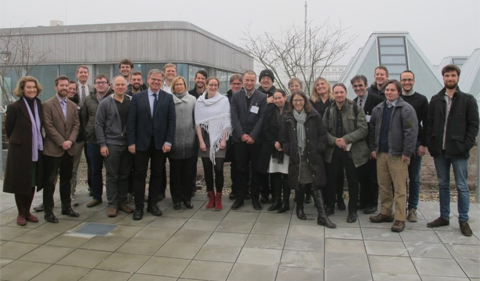
Participants from the “Making Sense of the Oath” Conference held in Berlin, December 2016.
In December, Dr. Kevin Uhalde, Associate Professor of History, finished his grading and traveled to Berlin, Germany to participate in a conference titled “Making Sense of the Oath in Late Antiquity and the Earlier Middle Ages: Religious Act, Social Bond, Holy Sacrament.”
Uhalde was invited to participate in this conference. As he put it, “It’s a topic I’ve been interested in for a long time but haven’t worked on recently.”
Uhalde presented a paper titled “The Shape of Early Christian Fidelity: Swearing and Repenting in the Face of Uncertainty.” It addressed what he sees as common ground between the concerns over oath swearing and repentance: “namely, the paradox of needing things like oaths and forgiveness because humans are prone to failure and deceit, but knowing that faulty, deceitful people will happily swear falsely or pretend they’re sorry when they’re not.”
The abstract for Uhalde’s paper reads as follows:
Swearing oaths is an ancient way of signifying trust, establishing relationships, and managing uncertainty. In Roman Faith and Christian Faith (Oxford, 2015), Teresa Morgan addresses the broader context of understanding and practicing fidelity in the first two centuries of the Roman Empire. “Deliberate, risk-taking trust,” Morgan writes, “fortified by evidence of the past and reified in oaths and rituals, enables the evolution of a relationship which is social and political as well as personal.” The question of whether Christian fidelity joins, displaces, or conflicts with the social, political, and personal nature of faith-based relationships bound by oaths is left open. This paper picks up where Morgan’s study leaves off, focusing on how Tertullian in the early second century and Augustine in the early fourth century instructed Christians regarding oaths. Swearing oaths was simultaneously a dangerous and necessary part of human society.
The first essay Uhalde published was in 1999 and titled “Proof and Reproof: The Judicial Component of Episcopal Confrontation.” It was about a Christian bishop in Merovingian Trier with a reputation for exacting vengeance, in life and from beyond the grave, against perjurers. In his Expectations of Justice in the Age of Austine (University of Pennsylvania Press, 2007), Uhalde included a chapter about about how Augustine of Hippo and other church leaders had come to accept swearing oaths as practical necessity, even though the New Testament seemed pretty clearly to forbid it. As Augustine observed, even as he acknowledged swearing oaths himself, the risk of swearing to something falsely goes away if a person doesn’t swear at all. However, the last time Uhalde wrote about this topic, though, was in a 2011 essay whose title he especially liked: “Barbarian Traffic, Demon Oaths, and Christian Scruples.”
For more on Uhalde’s research adn teaching interests, visit his department profile.



















Comments